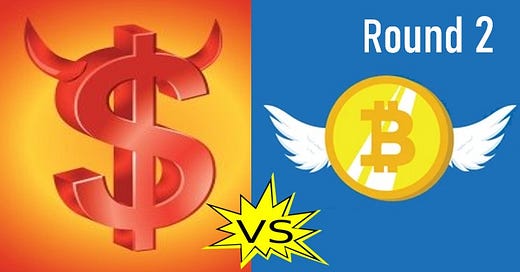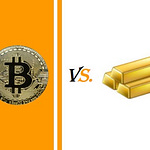Dear Readers,
Our world is in the midst of an extreme crisis: a debt crisis that threatens to wreak havoc on economies and standards of living around the globe. It’s estimated that the global debt level of governments, households, and corporations is nearly $300 trillion USD. For context, that’s much higher than the roughly $100 trillion in annual GDP, meaning that it would take humanity several years to generate enough cash flow to pay off the debt even if it were possible to completely dedicate GDP to servicing our debts for a few years.
Some observers may argue that certain types of debt, like mortgages on primary residences or student loans for higher education, are worth it. However, it’s hard to deny that the burden of debt humanity is living under is close to unbearable. Many countries, large and small, are struggling to balance budgets since interest payments on their debts take up an ever-increasing percentage of annual tax revenues.
The burden of government debt trickles down to everyday citizens as well. Rather than spending less than they take in and using the excess to pay down debt, governments instead resort to increasing taxes, reducing interest rates, inflating the money supply, or oftentimes a combination of all three. Each of those actions is harmful to workers, investors, and savers. But inflation is perhaps the most pernicious since it typically goes unnoticed by the average citizen. Inflation decreases citizens’ standard of living by reducing the purchasing power of their hard-earned money.
False Fiat Narratives: Government and the “Evil” of Deflation
Inflation has little to no benefits for the average person. Governments are the immediate benefactors since they use inflation to reduce the cost of their debts at your expense. State-sponsored economists would like people to believe that the “benefits” of inflation trickle down, but the reality is that almost all of the new money supply left over after governments have taken their enormous cut goes to the corporations they bail out year after year. Hardly any of it will ever arrive in the bank accounts and paychecks of everyday citizens, and whatever benefits they do receive are significantly outweighed by the massive costs of inflation that they paid to begin with.
Since inflation is so negative overall, governments have to work overtime to deceive their citizens about its true costs. Of course, it’s difficult to convince people that paying more in rent or for gas and food is a good thing. As a result, governments tend to focus their attention on trying to convince people that deflation rather than inflation is the true evil. Their arguments are unfortunately rather widespread. For example, Investopedia, a commonly used educational website for investing, economics, and finance, starts out an article about deflation as follows:
Typically, deflation is a sign of a weakening economy. Economists fear deflation because falling prices lead to lower consumer spending, which is a major component of economic growth. Companies respond to falling prices by slowing down their production, which leads to layoffs and salary reductions. This further lowers demand and prices.
Investopedia gets several things wrong. For starters, falling prices tend to lead to higher, not lower, consumer spending, at least for goods and services that are worth purchasing. Similarly, making a blanket statement about companies slowing down production when prices fall is extremely simplistic thinking. After all, the global economy and the supply chains supporting it are extremely interconnected. When prices fall as a result of deflationary pressures, they fall for most people. In other words, companies might be getting paid less for their outputs, but they’re also paying suppliers less for their inputs.
Bitcoin Fixes This
Two of the more common arguments critics use to attack deflationary currencies revolve around debts and salaries. Let’s look at both in the context of Bitcoin, the first perfectly deflationary currency to ever exist:
Debts Will Become More Expensive Over Time
The thought process here is that a deflationary currency will be overwhelmingly negative for debtors since the balance of their debt will become more expensive in real terms, and thus harder to pay off, over time. The fatal flaw of this argument is that it implies that all debts are worth taking on in the first place.
Having a deflationary currency like Bitcoin, which will always increase in value over the long-term since its supply stays the same while the supply of everything else increases, will not stop savers from making loans or debtors from taking them. After all, many debtors will find the increased cost of debt to still be acceptable if it puts a roof over their heads or improves their prospects through education. But a deflationary currency will make savers less likely to loan out their valuable holdings to governments who take advantage of them, corporations who don’t produce worthwhile goods and services, and other borrowers who don’t have the means to service their debts.
In a nutshell, a deflationary currency like Bitcoin trims out bad debt and turns the focus to good debt.
Workers Won’t Be Able To Accept Falling Wages
The thought process here is that a deflationary currency will cause workers to receive lower wages over the long-term. It’s certainly understandable that a lot of people believe this argument. After all, how would you feel if your boss came to you tomorrow and offered to pay you less money for the same amount of work? The fatal flaw of this argument is that it entirely ignores the real reason that wages would nominally decrease in the first place: since the purchasing power of deflationary money increases over time, companies can purchase more of their workers’ time and effort for the same amount of money.
Inflationary currencies have been with us for millennia. So the idea that our work might be compensated with less money while our actual purchasing power doesn’t change is completely foreign to us. Perpetual inflation has made us believe that prices and wages must always go up. But that will not always be the case. After a few decades on a deflationary, sound money system where prices and wages go down while the standard of living continues to go up will open our minds to the illusory wage gains of the current system.
With Bitcoin, those who earn the value of their money will retain it. And society will finally be able to enjoy the general decreases in prices that result from technological advancements and from increases in productivity that have been masked for decades by state-sponsored theft through inflation.
Read the next article in this series:
Scams.
Rugpulls.
Shady companies that will take away your hard-earned money the first chance they get.
That’s what most content creators in the Bitcoin and Crypto spaces offer their communities in exchange for the *free* content they promote in newsletters, on talk shows, on social media, and anywhere else they can peddle their wares.
YOU DESERVE BETTER.
You deserve quality Bitcoin education that isn’t driven by a need to sell you something that will leave you worse off. You deserve thoughtful analyses of Bitcoin basics and current events that leave out the biases that permeate affiliate-driven content platforms. You deserve a community that puts you first, no matter what.
We’ve built the HiFi Bitcoin community together as a place where quality Bitcoin education comes without any hidden agenda. A place where you come first, always.
If you believe that Bitcoin education should be available to everyone without bias and without ulterior motives, I ask you to please consider supporting me and the work I’m doing for the Bitcoin community through a premium membership. Every contribution increases my ability to cut through the noise and find the truth about Bitcoin with you.
A Special Bonus For Premium Members
In my new book, The Ultimate Pocket Bitcoin Glossary, I walk you through 30 of the most important terms you need to understand in order to get ahead in your Bitcoin journey. My hope is that it can be used to educate yourself about Bitcoin and as a quick reference when you’re trying to help others understand why you’ve chosen to purse a passion for Bitcoin.
Ready to read it yourself?
Premium subscribers of The HiFi Bitcoin Letters receive access to The Ultimate Pocket Bitcoin Glossary at no extra charge:
Free subscribers and non-subscribers will be able to purchase The Ultimate Pocket Bitcoin Glossary, without the commitment of subscribership, in the HiFi Bitcoin Shop, once it is released as a PDF:
Wish You Could Easily Take The Podcast With You?
Can’t Get Enough Bitcoin In Your Life? Follow Me On Social Media:
Bitcoin Roundup 🤠
Bitcoin Regulation: Binance’s CEO has indicated that he supports additional regulation of the cryptocurrency space in the interest of protecting users. Read more
Bitcoin Celebrity: Football superstar Odell Beckham Jr. has indicated that he will take his salary in Bitcoin through a partnership with Square’s CashApp. Read more
Bitcoin Corporations: Payments mega giant Stripe, which previously ended support for payments through Bitcoin, has indicated an openness to revisiting the possibility of supporting crypto payments on its infrastructure. Read more
Into the Twitterverse 🐥
Who’s going to be next?
A lot of factors are conspiring to impact Bitcoin’s price in the long-term:

🙋🏽♂️Did you enjoy this edition of The HiFi Bitcoin Letters?
This 3-question survey is your chance to tell me how I can improve the newsletter for you. Click here.
This is not financial or business advice. This newsletter and related content are for informational purposes only. Cryptocurrencies and digital assets can be risky. Always do your own research before making any sort of investment.


















Share this post